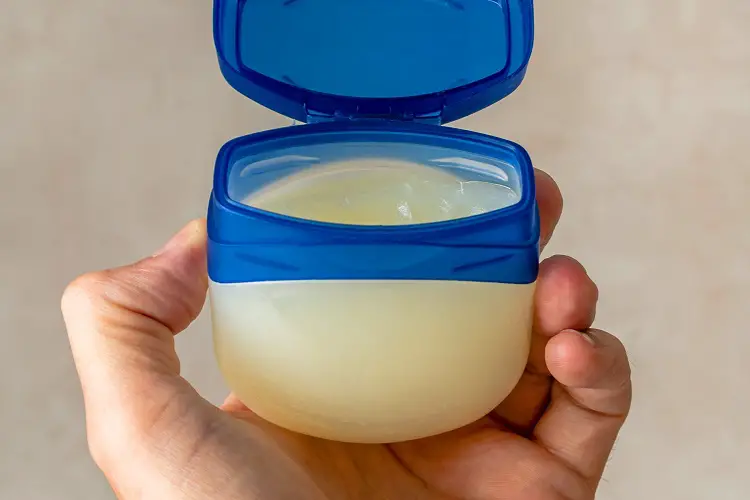Is your baby constipated? Are you wondering how to use Vaseline to treat constipation in babies? Don’t worry. All the answers you need are right here!
Constipation is the inability of a person to pass out stool easily. This situation can make babies uncomfortable because the pain babies experience during constipation can be unexplainable.
This situation can be resolved using Vaseline, especially for babies, as it can help relieve the pains experienced during constipation.
In this article, we will discuss everything you need to know about constipation, how to use Vaseline to treat constipation in babies, and other ways you can help relieve constipation in babies.
How To Use Vaseline To Treat Constipation In Babies

No mother feels happy seeing her baby undergo pain. As a concerned mom, it is normal to feel bad when your baby has constipation, which could make you feel restless until your baby returns to normalcy.
Do not get jittery if your baby is having difficulty passing out stool, there are lots of homemade remedies you can adopt to tackle the issue of constipation and it will become a thing of the past. One of them is the use of Vaseline.
If you are wondering how you can use Vaseline to achieve the result you so much desired, then you need not worry because we have the answers here for you.
In learning to use Vaseline as a homemade remedy for your baby’s constipation, all you have to do is…
- First, insert a Vaseline-greased thermometer or cotton swab–about one-half to one inch–into your baby’s anus.
- Now when you do this, your baby will respond by trying to push out the inserted object. This action is simply out of reflex because babies usually respond by bearing down to push the object out.
- While your baby is trying to push out the inserted object, you will notice that your baby may push out the stool.
Read: Is Silver Bird oil good for babies – Explained
What is Constipation?
Constipation can be described as the passage of stools (bowel movements) infrequently or the decline in the stool or the passage of hard stools.
There is no best definition for constipation, but the rate at which your baby passes out stool can be used as a yardstick to measure constipation once there is a decrease in the rate of stool passage or a feeling of pain while the stool is being passed.
The occurrence of constipation in children is high, but parents often do not need to seek remedies from doctors or pediatricians because there are many home remedies on how to treat constipation, especially in babies.
What Causes Constipation?

There is no standard yardstick on what causes constipation as there could be many determining factors to the causes of constipation.
One of the generally accepted causes of constipation has been linked with diets. The diet of a breastfeeding mother can cause constipation in her baby.
Sometimes even the diet of your baby can also be the cause of constipation, some formulas have been identified as being one of the causes of constipation in babies.
There are other causes of constipation, such as over-the-counter cold medications and antacids, which should be discouraged. Try seeking the expertise of a pediatrician whenever your baby needs medical attention.
The use of antidepressants, anticonvulsants, chemotherapy medications, and Narcotic pain medications (such as codeine) can also cause constipation in your baby.
There are also other causes of constipation experienced by your baby and they include
- Researchers have identified Hirschsprung’s disease as one of the causes of constipation in babies.
- Hypothyroidism which is a condition that deals with the thyroid gland have been identified as one of the causes of constipation in babies.
- Researchers have placed the nervous system problem as one of the causes of constipation and the nervous system is in charge of the response and coordination of the human body.
- Researchers have enumerated lead poisoning as one of the causes of constipation in kids.
Signs Your Baby Is Constipated
- A baby is said to be battling constipation if you notice a reduction in bowel movement, especially if he or she has less than three bowel movements per week. You should also suspect constipation if your baby groans while passing out stool.
- Your baby is battling with constipation when he/she is trying to avoid passing out stool because of the painful experience. Toddlers often exhibit characteristic behaviors while trying to avoid bowel movements.
- Your baby is said to be constipated when you notice rising on his/her toe, rocking back and forth, and holding his/her legs and buttocks stiffly.
- Watch your baby’s reaction after being placed on certain drugs or medication because constipation could be one of the side effects. Some drugs can make babies more likely to be constipated.
- Common contributors to constipation in toddlers and children include;
- over-the-counter cold medications and antacid,
- antidepressants,
- anticonvulsants,
- chemotherapy medications, and
- Narcotic pain medications (such as codeine).
- Other signs that toddlers and children are constipated may include;
- vague abdominal
- pain around the navel (belly button),
- severe attacks of abdominal pain,
- decreased appetite,
- nausea, or vomiting,
- urinary incontinence,
- frequent urination, or bedwetting, and
- Reappearing urinary tract infections.
Read Also: How Long Can A Breastfeeding Baby Go Without Pooping? Find Out
Other Ways To Help Constipated Babies
1. Drink Enough Water
Water is very essential for everyone. Among keeping our skin refresh, helping transport oxygen to your body, and lubricating joints, to mention but a few, water also helps flush body waste products out of the body.
Since constipation is related to dehydration in the human colon, so our first line of action should be to drink water. One way to get your baby to drink enough water during the day is by giving them access to a water bottle.
Some babies won’t demand something that isn’t there, so ensure you make it easily available to them. Buying a cute water bottle like this here ensures your baby is getting plenty of liquids on the go.
2. Fruit Drinks With Diuretic Effect (Prune, Mango, Pear)
Some babies dislike the taste of water. But, we all know staying hydrated is super very necessary, especially when the baby is constipated.
As a parent, if you’re finding it difficult to get your baby to drink water, then you should offer them fruit juice like a prune, mango, or pear juice or mix it with water; this way, your baby gets more liquid into his/her system.
Certain drinks like prune juice contain sorbitol which helps make stools easier to pass. For mild constipation, a half to a full cup of juice once a day may be enough to ease the pain.
3. Boost Your Fiber Intake with Fruits, Vegetables, and High-Fiber Foods
Along with getting enough liquids down the baby’s system, relieving constipation can also be done by increasing your fiber intake.
High-rich fiber foods such as whole grains, fruits, and vegetables are very important for human digestive health and bathroom bliss. So when next you go shopping, make sure you stick up properly.
Some baby-friendly high-fiber foods are:
- Fruits (apples and pears)
- Vegetables (broccoli and peas)
- High-fiber cereal, for example, raisin bran flakes
- All types of beans
- Whole-grain bread
4. Remove Any Dairy and Constipation Inducing Foods
Just like eating certain foods to help relieve constipation, there are also certain foods to avoid to help relieve constipation in babies, and these foods, including cheese and milk, are ill-advised since they are highly processed foods and sweets.
So to help relieve your baby from constipation, you should begin seeing these foods as treats (yes, even the cheese!) and only eat that processed food occasionally once the situation begins to ease.
5. Exercise and Movement
To help relieve constipation from babies, try exercise or engage in active moving, whether it’s sports, dancing, or running around the playground. These activities help food through the digestive process.
Sitting and watching your favorite show on TV wouldn’t help. So, try going for a walk as a family or engage in yoga activities as a family. This will help a lot.
6. Use the Bathroom Regularly
Some babies are just more interested in playing around with their toys or close friends than in using the bathroom. Withholding bowel activities hinder regular movement and could result in constipation.
Encouraging your little one to use the bathroom often may be all that you need to help relieve their constipation. One of the best times to do this is immediately after meals. Let your baby sit for at least 10 minutes.
Possibly, offer them books or let the baby use their digital device. This will help the baby relax while waiting to stool.
Make sure you keep a stool under their feet for better pooping posture, and after the baby is done, reward them with stickers to encourage them to do more.
7. Take It Easy On Toilet Training
Most times, constipation in babies happens during potty training. The various changes that come with potty training, such as learning how to use the bathroom, can lead to stress for the baby and may prohibit the baby to not pooping.
Learn to take a step back and ease up on potty training. Break out the diapers again, and allow your baby to get comfortable to get things moving independently. Then in a few weeks, give it a try again when bowel movements start to look normal.
8. OTC Fiber Supplements and Stool Softeners
Sometimes to relieve constipation in babies, you may need to offer the baby over-the-counter fiber supplements and/or stool softeners. But before doing this, make sure you consult your doctor.
9. Laxative or Enema
If you’re dealing with a severely constipated baby and you’ve tried everything else, you may need a laxative or enema to help clean out the blockage and allow regular bathroom use.
Although this can be bought over the counter, too, just like fiber supplements and stool softeners, don’t forget to discuss it with your doctor first before performing any procedures.
Related Posts:
- Can I Use Regular Vaseline For Baby? Explained
- How Much Milk Should a Baby Drink?
- How Much Water Should I Drink While Breastfeeding?
- What To Eat When Breastfeeding a Sick Baby (3 Best Foods)
Conclusion
We hope this article has given an in-depth discussion to answer the question of how to use Vaseline to treat constipation in babies. It’s a shame that toddler constipation is one of those topics most parents don’t want to talk about.
However, the best way to relieve constipation in babies is to prevent it in the first place. By staying hydrated, eating fiber foods, and minimizing your intake of processed foods, your baby shouldn’t have any problem using the bathroom.
Peradventure, if your baby becomes constipated, you can try practicing any of these tips we mentioned above to help get you back on track.
